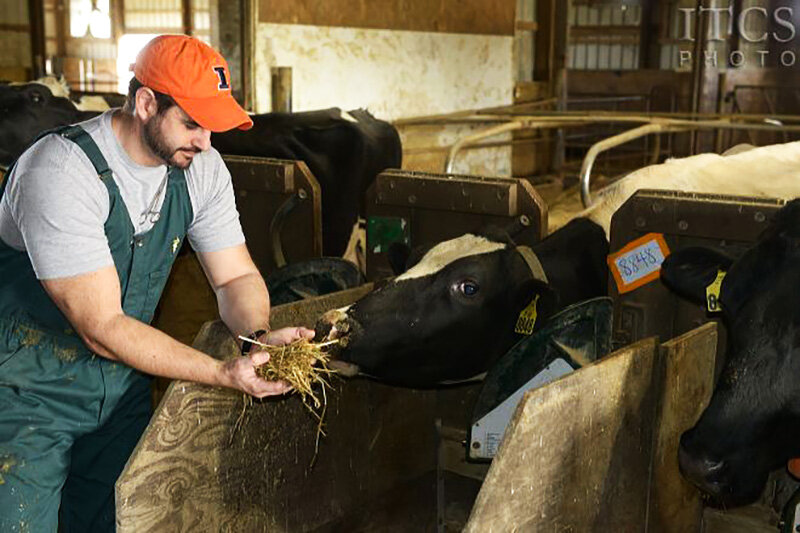University of Illinois researchers including Phil Cardoso (pictured) found that rumen-protected lysine improved uterine health in dairy cows during the transition period. Photo credit: University of Illinois
Lysine is an essential amino acid for dairy cows and helps increase milk production when added to the diet in appropriate amounts. But could lysine benefit cows in other ways? A new University of Illinois study shows that rumen-protected lysine can improve uterine health when fed during the transition period. The study “Effect of feeding rumen-protected lysine during the transition period on postpartum uterine health in dairy cows” is published in the Journal of Dairy Science.
“Immediately after calving, the uterus goes through many changes. The cow had 100 pounds of calf, placenta and fluids in it, but 30 to 40 days after calving, the uterus needs to shrink again and prepare for the next pregnancy. Many cells are regenerating and the cow may be susceptible to infection and inflammation at this point,” said Phil Cardoso, associate professor and faculty extension specialist in the Department of Animal Sciences at the U of I.
Cardoso and his team added a rumen-protected lysine product to the total mixed ration (TMR) at 0.54% 28 days before calving. After calving, the lysine was added at 0.4% for a further 28 days. Cows received the lysine supplement before or after calving, or both, with an additional control group receiving no supplemental lysine in either period.
“We found that genes involved in the production of inflammatory proteins in the uterus were reduced by rumen-protected lysine, particularly in cows that consumed the amino acid before and after calving. And genes involved in keeping the uterus clean were more active. Overall, our results show less inflammation in these cows, which means they have to expend less energy defending themselves against infection,” says Cardoso. “It’s just more efficient.”
In addition to characterizing gene expression in the uterus, the team looked for evidence of metritis, a uterine infection that affects 30% of US dairy cows after calving. While the general inflammatory state of the uterus improved with lysine supplementation, the researchers found no statistical difference in metritis between cows that consumed lysine and those that did not.
“Metritis is the clinical presentation of uterine inflammation. It requires a greater level of environmental challenge to show itself. Perhaps our farm is not really stressful in that regard. We found a difference in the subclinical form, also called subclinical endometritis. When we counted the number of inflammatory cells (PMN) in the uterus, cows that received rumen-protected lysine had a lower number of cells, indicating less inflammation,” says Cardoso.
The team also tracked the first postpartum follicular growth cycle in the ovaries. Lysine had no effect on time to first ovulation – which was an average of 18 days in milk for all groups – nor on follicle diameter at the time of ovulation.
Cardoso is neither surprised nor disappointed that lysine does not affect ovulation. He says uterine health right after calving is more important than producers think.
“If you ask farmers how they assess reproductive progress and fertility, the answer is always pregnancy. Farmers typically breed cows around 60 to 70 days after calving, but failure to do so is often due to events such as metritis or subclinical endometritis before breeding, earlier in the cycle. This research shows that rumen-protected lysine can set your cow up for success right after calving so she can later achieve a favorable pregnancy.”
The effects of lysine are consistent with Cardoso’s previous work looking at rumen-protected methionine, another limiting amino acid in dairy cows. He showed methionine-affected genes linked to inflammation and estrogen production and increased embryo survival.
“Our recommendation is to use both rumen-protected methionine and lysine,” says Cardoso. “We know that both amino acids are limiting in dairy cows, but it’s not clear if standard diet sources — corn or blood meal — will make it through the rumen to provide cows with the amount they need.”
Although rumen-protected lysine and methionine products are not widely incorporated into commercial feeds, Cardoso said nutritionists are beginning to recognize their importance in the industry.
“Nutritionists are the ones who come up with what it takes to get results, and they’re becoming aware of rumen-protected amino acid products. But we also want to educate farmers so they can start talking to nutrition experts, and asked, “Hey, could this help me?”
The authors of the study include Anne Guadagnin, Laura Fehlberg, Brittney Thomas, Yusuke Sugimoto, Izuru Shinzato and Phil Cardoso.
Dietary supplements can improve the health and reproductive capacity of dairy cows
AR Guadagnin et al, Effect of feeding rumen-protected lysine during the transition period on postpartum uterine health in dairy cows, Journal of Dairy Science (2022). DOI: 10.3168/jds.2022-21934
Provided by the University of Illinois at Urbana-Champaign
Citation: Amino acid supplement is a key to reproductive health in milk cows (2022, September 19), retrieved September 19, 2022 from https://phys.org/news/2022-09-amino-acid-supplement-key- reproductive.html
This document is protected by copyright. Except for fair trade for the purpose of private study or research, no part may be reproduced without written permission. The content is for informational purposes only.
#Amino #acid #supplementation #key #reproductive #health #dairy #cows


Leave a Comment